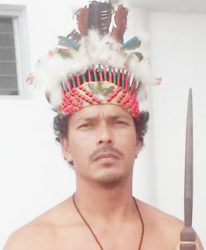Toshao Lenox Shuman, elected village leader of St Cuthbert’s Mission on the Mahaica River, is adamant that the recent attempts by residents to have him removed were intended to undermine the work of the current village council, but says he welcomes the investigation as it will help to clear the air .
Shuman, a re-migrant from Canada and current Vice-Chairman of the National Toshaos Council (NTC), was reportedly suspended from his position as village leader last Sunday by the Ministry of Indigenous Peoples’ Affairs to enable an investigation into allegations against him.
According to the statement issued by the ministry, notice of suspension was given on January 27, after a petition signed by at least 125 residents of St Cuthbert’s Mission was received by the Minister on January 12, 2017.

It further stated that during the period of proposed suspension, an investigation would be launched into a number of written complaints against the Toshao, which were received by the Minister.
However, Shuman in an interview with Stabroek News, said he believed the attempts to impeach him were tactics meant to undermine his work and that of the village council, which took office in July 2015.
Based on documents seen by this newspaper, it would seem that the first petition was drafted following an interaction between the village council and several members of a religious group in the community.
Shedding some light on the situation, Shuman said the issue stemmed from the religious body, which he identified as the Universal Church, not having prior permission from the council to enter the village, as stipulated by the Amerindian Act of 2006. According to the Act, prior consent must be granted by the council before permission is granted to non-residents desirous of entering the village.
Though he could not say how long the religious body has been operating in the village, Shuman claimed permission was never granted by the council, nor has the church produced any form of documentation to show consent given by any of the previous councils.
“We had invited the church leaders for a meeting and the leader was absolutely disrespectful to the village council as he wanted to hear nothing of what we had to say. All he wanted to do was dictate the terms of his entry and stay within the community and no one can control that,” Shuman explained.
Adding fuel to the fire, Shuman said, the religious body refused to pay the stipulated fees for rental of community assets such as the benab, chairs and the youth building. The fees, he said were implemented by the village council as a way of recovering village assets after taking office in 2015 and realizing the treasury was empty except for $43,150.
But after several futile engagements, the Universal Church eventually began operating on land belonging to a resident in the community; the same resident, he said, appeared to be the driving force behind the first petition.
The Toshao pointed out that when the village council was informed of the church’s occupancy of the resident’s land and that a structure would be constructed to facilitate the congregation, the council sought an audience with the woman to explain to her that what she was doing was not in keeping with village laws.
He explained that once land applications were granted, the land could only be used for the express purpose stated on the application and in her case it was to build a homestead. Thus, her decision to use the land to construct a building for the church would be in contravention of the basis on which the application was granted.
“We contacted her and told her that she cannot construct a church on her land, it was given for a homestead,” Shuman related. He added that she was told she would need to apply again to the council for permission to build a church.
“I told her that if she cannot conduct herself as stipulated by law, then we will have to demarcate her property and treat her as an external entity wishing to enter in an agreement with the council; that being said, we would have to give her a small plot and in order to utilize the utilities, we will have to levy a different fee,” he added.
This, however, did not sit well with the woman or the church congregation and that, he said, was what he believed fuelled the first petition.
Shuman said the second petition came on the heels of the village council’s efforts to address an issue of $2.6 million that were not accounted for under the last council.
“So because we are trying to have them [the previous councillors] account for the missing money, they are trying to unseat the council by signing a petition to have me removed,” the Toshao contended.
Also of concern for him, was the fact that several names on the petition had appeared more than once, while there were other persons who claimed to have no knowledge of how their signatures ended up on the petition.
Nonetheless, Shuman said, he welcomed the investigation since he believed that once it was conducted in an impartial manner, the findings will prove that the community was on its way to good governance.
Further, he wished to encourage other indigenous leaders who may be faced with similar situations to just submit and let the necessary investigations be conducted; regardless of the findings, Shuman said leaders should be able to accept the results and move on.
The investigation is expected to be completed in 21 days, and was scheduled to have begun on Sunday, the day the announcement was made.
In the meantime, Deputy Toshao Foster Simon has been asked to overlook village affairs. Three other councillors have stepped aside in solidarity with Toshao Shuman while investigations are underway.





